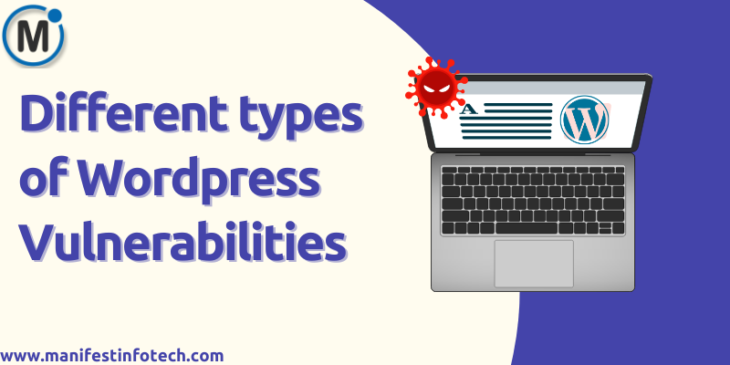
WordPress, a popular content management system (CMS), is used by millions of websites worldwide. However, its widespread use also makes it a target for hackers and malware. There are various types of vulnerabilities and malware that can affect WordPress websites. Here are some common ones:
𝟏. 𝐒𝐐𝐋 𝐈𝐧𝐣𝐞𝐜𝐭𝐢𝐨𝐧 (𝐒𝐐𝐋𝐢): SQL injection occurs when an attacker inserts malicious SQL code into input fields, often leading to unauthorized access to the website’s database. WordPress websites are vulnerable to SQLi if not properly secured.
𝟐. 𝐂𝐫𝐨𝐬𝐬-𝐒𝐢𝐭𝐞 𝐒𝐜𝐫𝐢𝐩𝐭𝐢𝐧𝐠 (𝐗𝐒𝐒): XSS vulnerabilities allow attackers to inject malicious scripts into web pages viewed by other users. This can be used to steal user information, deface websites, or spread malware.
𝟑. 𝐂𝐫𝐨𝐬𝐬-𝐒𝐢𝐭𝐞 𝐑𝐞𝐪𝐮𝐞𝐬𝐭 𝐅𝐨𝐫𝐠𝐞𝐫𝐲 (𝐂𝐒𝐑𝐅): CSRF attacks trick users into performing unwanted actions without their knowledge or consent, often leading to actions like changing passwords, making unauthorized purchases, or modifying site settings.
𝟒. 𝐑𝐞𝐦𝐨𝐭𝐞 𝐂𝐨𝐝𝐞 𝐄𝐱𝐞𝐜𝐮𝐭𝐢𝐨𝐧 (𝐑𝐂𝐄): RCE vulnerabilities enable attackers to execute arbitrary code on the server, potentially taking control of the entire WordPress site.
𝟓. 𝐁𝐫𝐮𝐭𝐞 𝐅𝐨𝐫𝐜𝐞 𝐀𝐭𝐭𝐚𝐜𝐤𝐬: Attackers attempt to gain unauthorized access to a WordPress site by repeatedly trying different username and password combinations. This can be mitigated by using strong passwords and implementing login rate limiting.
𝟔. 𝐕𝐮𝐥𝐧𝐞𝐫𝐚𝐛𝐥𝐞 𝐏𝐥𝐮𝐠𝐢𝐧𝐬 𝐚𝐧𝐝 𝐓𝐡𝐞𝐦𝐞𝐬: Many WordPress vulnerabilities stem from outdated or poorly coded plugins and themes. Attackers often target these components to exploit vulnerabilities and gain access to the site.
𝟕. 𝐌𝐚𝐥𝐢𝐜𝐢𝐨𝐮𝐬 𝐑𝐞𝐝𝐢𝐫𝐞𝐜𝐭𝐬: Malware can be injected into a WordPress site to redirect visitors to malicious or phishing websites. This is often done to steal sensitive information.
𝟖. 𝐁𝐚𝐜𝐤𝐝𝐨𝐨𝐫 𝐀𝐭𝐭𝐚𝐜𝐤𝐬: Attackers may install backdoors on compromised WordPress sites, which provide them with ongoing access and control over the site even after apparent security fixes.
𝟗. 𝐌𝐚𝐥𝐰𝐚𝐫𝐞 𝐈𝐧𝐟𝐞𝐜𝐭𝐢𝐨𝐧𝐬: Malware can infect WordPress sites, compromising their functionality and potentially spreading to visitors’ devices.
𝟏𝟎. 𝐅𝐢𝐥𝐞 𝐔𝐩𝐥𝐨𝐚𝐝 𝐕𝐮𝐥𝐧𝐞𝐫𝐚𝐛𝐢𝐥𝐢𝐭𝐢𝐞𝐬: WordPress allows users to upload files, which can be exploited if not properly sanitized. Attackers might upload malicious files to execute code or gain access to the server.
To protect your WordPress website from these vulnerabilities and malware, it’s crucial to take security measures such as:
– Keeping WordPress core, themes, and plugins up-to-date.
– Using strong, unique passwords and implementing two-factor authentication.
– Installing a WordPress security plugin.
– Regularly scanning for malware and vulnerabilities.
– Using a Web Application Firewall (WAF).
– Limiting login attempts and implementing IP blocking for repeated failed login attempts.
– Reviewing and testing any code, themes, or plugins before installation.
– Following security best practices and guidelines recommended by WordPress.
If you are looking for any services related to Website Development, App Development, Digital Marketing and SEO, just email us at nchouksey@manifestinfotech.com or Skype id: live:76bad32bff24d30d
𝐅𝐨𝐥𝐥𝐨𝐰 𝐔𝐬:
𝐋𝐢𝐧𝐤𝐞𝐝𝐢𝐧: linkedin.com/company/manifestinfotech
𝐅𝐚𝐜𝐞𝐛𝐨𝐨𝐤: facebook.com/manifestinfotech/
𝐈𝐧𝐬𝐭𝐚𝐠𝐫𝐚𝐦: instagram.com/manifestinfotech/
𝐓𝐰𝐢𝐭𝐭𝐞𝐫: twitter.com/Manifest_info
#WordPressVulnerabilities #WordPressSecurity #WebSecurity #CyberSecurity #WebsiteProtection #MalwareDetection #SQLInjection #XSSAttack #CSRFVulnerability #RCEExploit #BruteForceAttacks #PluginSecurity #ThemeVulnerabilities #WebsiteHacking #WordPressTips #WebsiteMaintenance #SecurityBestPractices #WebsiteHardening #CyberThreats #OnlineSafety